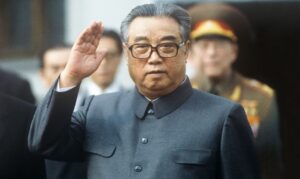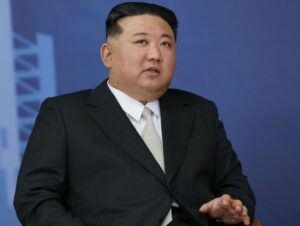| Name | Term of Office | Political Party |
|---|---|---|
| Kim Tu-bong | 9 September 1948 – 20 September 1957 | Workers' Party of North Korea |
| Choe Yong-gon | 20 September 1957 – 28 December 1972 | Korean Social Democratic Party |
| Kim Il Sung | 28 December 1972 – 8 July 1994 | Workers' Party of Korea |
| Kim Yong-nam | 5 September 1998 – 11 April 2019 | Workers' Party of Korea |
| Kim Jong Un | 11 April 2019 – Present | Workers' Party of Korea |
READ ALSO: Presidents That Have Ruled Syria Till Date
The First President: Kim Il Sung

Kim Il Sung was the founding leader of North Korea, ruling from its establishment in 1948 until he died in 1994. Born on April 15, 1912, in Mangyongdae, he became a prominent figure in the anti-Japanese resistance during World War II.
After the war, he was appointed as the leader of North Korea by the Soviet Union. Before becoming the President, Kim Il Sung held various positions, including:
- Premier: Head of government from 1948 to 1972.
- Chairman of the Workers’ Party of Korea: He consolidated power and established a one-party state.
Notable Achievements
- Korean War Leadership: He led North Korea during the Korean War (1950-1953), which solidified his position as a national hero.
- Cult of Personality: Established a strong personality cult that portrayed him as the “Eternal President,” influencing North Korean society and politics.
- Industrialization: Implemented policies that led to rapid industrialization and improvements in literacy and health care.
Downsides
- Repressive Regime: His rule was marked by severe human rights abuses, including political purges and suppression of dissent.
- Economic Challenges: While initial industrial growth occurred, his later policies led to economic stagnation and famine in the 1990s.
READ ALSO: Presidents That Have Ruled Nepal Till Date
Current Supreme Leader: Kim Jong Un

Kim Jong Un, born on January 8, 1984, is the current Supreme Leader of North Korea, having assumed power after the death of his father, Kim Jong Il, in December 2011. He was educated in Switzerland and is known for his relatively youthful appearance in a leadership role.
- Vice Chairman of the Workers’ Party of Korea: Before becoming the leader, he was groomed for leadership and held various positions within the party.
- Chairman of the State Affairs Commission: This role has been pivotal in consolidating his power.
Notable Achievements
- Economic Reforms: Initiated limited economic reforms aimed at improving productivity and living standards.
- Diplomatic Engagements: Engaged in historic summits with South Korean President Moon Jae-in and U.S. President Donald Trump, aiming to ease tensions and discuss denuclearization.
- Military Developments: Advanced North Korea’s missile and nuclear programs, asserting the country’s military capabilities.
Downsides
- Continued Human Rights Violations: His regime is known for its brutal repression of dissent and widespread human rights abuses.
- Aggressive Posturing: Maintained a confrontational stance towards South Korea and the U.S., leading to increased regional tensions.
READ ALSO: Presidents Who Have Ruled Afghanistan Till Date
Current Vice President
Note: North Korea does not currently have a vice president. The position of Vice President of North Korea was officially established in 1972 but was abolished in 1998.
The last individual to hold the title was Kim Yong-ju, who served until the position was dissolved following the death of Kim Il Sung and during the leadership of Kim Jong Il.
Conclusion
The leadership of North Korea has been characterized by a dynastic succession, with the Kim family maintaining tight control over the country’s political landscape. Each leader has left a distinct mark on the nation, shaping its policies, international relations, and internal dynamics.
